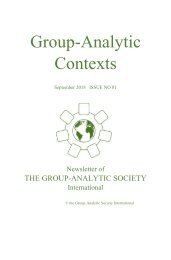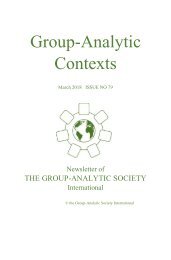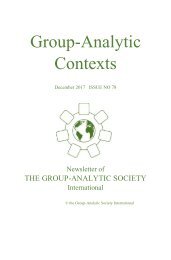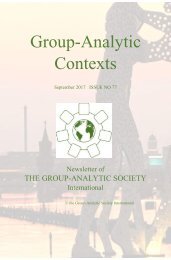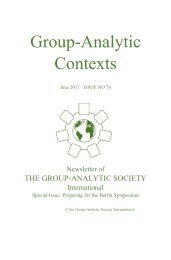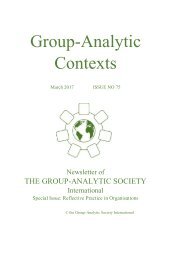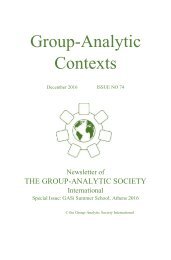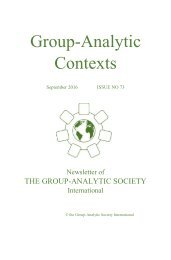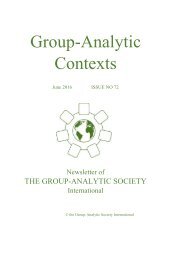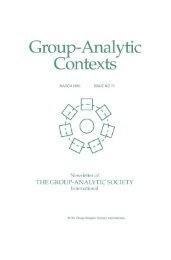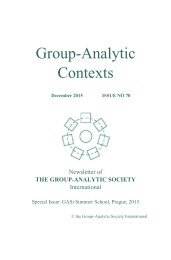Group-Analytic Contexts, Issue 80, June 2018
Create successful ePaper yourself
Turn your PDF publications into a flip-book with our unique Google optimized e-Paper software.
Newsletter – Summer <strong>2018</strong> 15<br />
ability to recognize imminent rupture of alliance, her interests in<br />
patients feed-back and that diligence makes a difference.<br />
Nissen-Lie et al. (2017) noted from their study that a<br />
combination of self-doubt as a therapist with a high degree of selfaffiliation<br />
as a person was particularly fruitful, while the combination<br />
of little professional self-doubt and much positive self-affiliation was<br />
not. Training is about adjusting self-confidence and being conscious<br />
about the unintegrated grandiosity.<br />
Personal development takes time and never stops. From the<br />
EGATIN Survey in 2008, we know that there are large variations from<br />
institute to institute in Europe regarding what is found to be an<br />
appropriate amount of self-experience, before graduating can be<br />
granted.<br />
As something unique the group analytic society, including<br />
EGATIN, has a culture where we meet in small experiential groups,<br />
when we gather. A tradition which I think has a quality of still learning<br />
by experiencing new aspects about ourselves, not only because we<br />
change but also because 'the times are changing'.<br />
Everyone knows that personal development is an individual<br />
matter, even though Foulkes’ general recommendation of 'twice a<br />
week for three years' for patients has led to EGATIN's<br />
recommendation of a minimum 240 hours in a small group. The<br />
differences are based on different cultures, but leave us with the<br />
question: when are we 'good-enough' to 'handle' patients in our own<br />
patient group?<br />
Theory Seminars<br />
Selecting theory texts is always a challenge. There is a strong urge<br />
from the trainees to make it simple, not too complicated - which is a<br />
contradiction! Theory seminars should include core concepts -<br />
meaning they should embrace and explore the genuine thoughts of<br />
<strong>Group</strong> Analysis. It should also be relevant - meaning it should connect<br />
to practice.<br />
A frequent complaint is that the texts are old, as if age should<br />
be a valid criterion. But it's relevant also that new developments are<br />
represented (for example more recent attachment theory). And the<br />
plea from the candidates is to serve all in a palatable balance of<br />
investment, gratification and time!<br />
When I, from time to time, read diploma papers, it is<br />
recurrent, that many patients in groups are very disturbed and the<br />
candidates have problems with maintaining boundaries and<br />
preventing drop-outs. The method seems not to fit the task. Lorentzen



